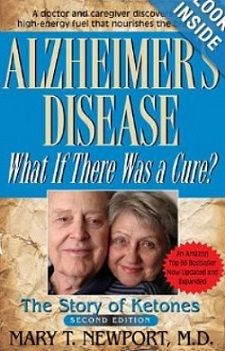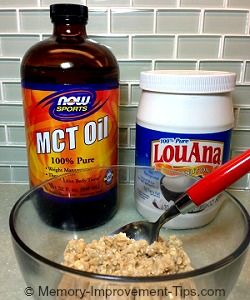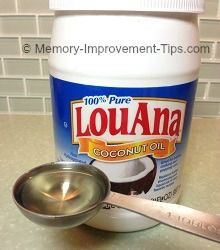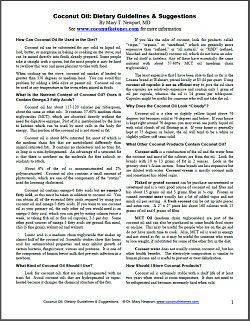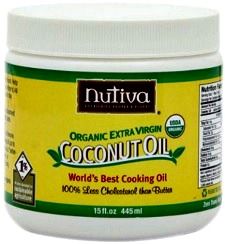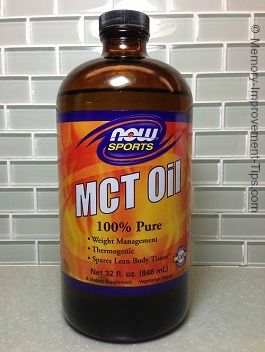- Home
- Better Memory
- Natural Treatment for Alzheimers
Surprising Natural Treatment for Alzheimer's Dementia: Coconut Oil
What if there was a natural treatment for Alzheimer's dementia on the shelf at your local grocery? There just may be.
Growing evidence suggests that daily doses of coconut oil may reverse memory loss and other symptoms of Alzheimer's disease in some people.
I remember my once-vibrant great-grandmother succumbing to Alzheimer's dementia when I was a child. So when I recently heard stories from those who say coconut oil has stopped Alzheimer's in its tracks and improved their memory, I sat up and noticed.
Since Alzheimer's runs in my family, I've now started taking coconut oil myself as a preventive measure. You and your loved ones may want to do the same. This page will tell you what you need to know to get started.
Note: Take a look at turmeric spice as well if you are searching for alternative treatments for Alzheimer's or for ways to lower your risk.
Coconut Oil for Alzheimer's Relief
Alzheimer's disease is one of the most devastating causes of memory loss, and there is no cure. Prescribed medications often fail to halt the decline and certainly do not reverse the disease.
But you may be surprised to learn that a number of Alzheimer's patients now swear that taking coconut oil has relieved many of their Alzheimer's symptoms, including problems with memory, vision, and walking. (It even helps Parkinson's disease.)
Coconut Oil Provides Fuel for Brain Cells. The brain survives on "glucose", a form of sugar which is the primary source of fuel for brain cells. In Alzheimer's disease, the brain starts to have problems absorbing glucose. Brain cells that don't get enough glucose wither and die, resulting in poor concentration and memory.
Coconut oil (and the related MCT oil) provides brain cells with an alternative fuel, called ketones. These ketones are easily absorbed by brain cells as a source of energy. Having sufficient fuel improves brain cell health, thereby reducing or even reversing the symptoms of Alzheimer's dementia.
Coconut oil has been popularized as a natural treatment for Alzheimer's disease by Dr. Mary Newport. Her husband, Steve, was diagnosed with early-onset Alzheimer's dementia. Searching for a treatment for her husband, Dr. Newport uncovered the research of Dr. Richard Veech, who over many years has investigated the metabolic effects of ketones.
A neonatalogist by profession, Dr. Newport's new mission became saving the life of her husband from dementia using coconut ketones to slow or reverse Alzheimer's progression.VIDEO: Coconut Oil Touted as Alzheimer's Remedy
Below I show you what coconut oil looks like, where to find it, how much it costs, and easy ways include it in your normal diet. My goal is to help you decide whether it makes sense for you or your loved one to try coconut oil as a natural treatment for Alzheimer's symptoms.
How Does Coconut Oil Reverse Alzheimer's Symptoms?
Coconut oil is special. Unlike most cooking oils, salad oils, and oil supplements (such as fish oil, olive oil, canola oil, or peanut oil), coconut oil contains a high percentage of a molecule called medium chain triglycerides (MCT). These MCT molecules are converted to ketones in the liver. Ketones cross the blood-brain barrier and can act as an alternative food for brain cells.
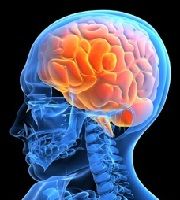
Normally your brain receives its energy from glucose, a sugar molecule. But in many Alzheimer's patients, the brain's cells (called neurons) lose the ability to absorb glucose. Brain cells then literally starve to death. This problem with glucose absorption was described as "Type 3 Diabetes" of the brain in a landmark 2005 research study by Brown University Medical School.
Diabetes of the brain is a problem of insulin, a hormone produced by the pancreas. Insulin is used by the body to drive glucose into cells. In Alzheimer's disease, this insulin-glucose interaction begins to fail in two ways:
Insulin levels in the brain are lower than normal (insulin deficiency), and
The ability of insulin to "open up" cells to receive glucose is decreased (insulin resistance).
These problems with insulin prevent glucose from entering brain cells normally, and these cells are starved of fuel. Ketones do not require insulin to enter brain cells and essentially bypass this problem.
The idea that ketones can be used by brain cells for energy is not controversial. In people who lack glucose due to starvation, the body automatically switches to the production of ketones from stored fat for the brain to use as energy. This is well established.
What's new is Dr. Newport's insight that glucose starvation of brain cells in Alzheimer's disease is similar to glucose insufficiency during actual starvation.
In both situations, brain cells cannot get enough glucose. In both situations, an alternative brain fuel - ketones - offers neurons a chance to survive.
That's why supplementing with coconut oil and MCT oil acts as a natural treatment for Alzheimer's.
These oils are not a cure for Alzheimer's. The tangles and plaque are not removed from the brain. The problem of glucose metabolism and insulin is not solved. But rather than dying sooner from lack of glucose, neurons in the Alzheimer's patient's brain can survive longer using ketones as alternative fuel.
Discovery of Coconut Oil as a Natural Treatment for Alzheimer's
Coconut oil entered the national conversation as a natural treatment for Alzheimer's symptoms in 2008, largely due to the efforts of a single person: Dr. Mary Newport, a neonatalogist in Tampa, Florida.
VIDEO: Dr. Mary Newport Explains How She Discovered Coconut Oil as a Natural Treatment for Alzheimer's
Dr. Newport's husband, Steve, was diagnosed with severe early onset Alzheimer's disease, and Dr. Newport was determined to find an effective treatment.
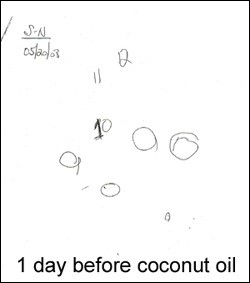
Steve's memory and quality of life worsened rapidly. Prescribed medication failed to slow his decline. When, during a cognitive test administered by his physician, Steve was asked to draw the face of a clock, the sketch at right is what Steve drew. (I have reprinted Steve's clock tests here with Dr. Newport's permission.)
As a neonatalogist, Dr. Newport has a strong background in medicine. She began reading study after study about Alzheimer's treatment. The CBN news video above describes how, during her research, Dr. Newport made the connection that ketones could be an alternative source of brain fuel for her husband.
Dr. Newport was struck by the findings of a particular study of a compound called AC-1202. The study found that AC-1202 actually improved the memory of participants who had Alzheimer's disease. In the TEDx video above, she describes her surprise that memory improvement was observed. The substances tested in other studies did not improve memory, but only slowed the rate of cognitive decline.
Long story short, she looked up the patent application for AC-1202 and found the main ingredient to be medium chain triglycerides (MCTs). Dr. Newport realized that some foods contain MCTs naturally, and that MCTs are converted into ketones naturally by the liver. She pinpointed coconut oil as containing a much higher percentage of MCTs than almost any other food.
So, she immediately started giving her husband two tablespoons of coconut oil three times per day. Within two weeks, he scored significantly higher on the Mini-Mental Status Exam (MMSE), an Alzheimer's cognitive function test assigned by his doctor. The dramatic improvement in Steve's thinking and memory is obvious from the clock test given to him again at 14 days and 37 days after starting on coconut oil. Those drawings actually resemble a clock!
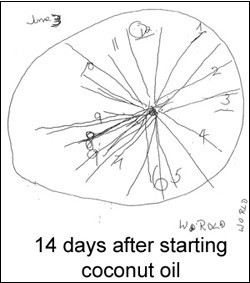
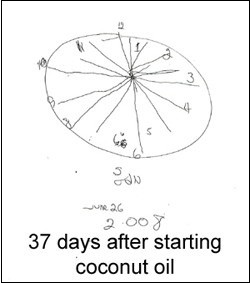
According to Dr. Newport, Steve soon became more like his old self. His sense of humor returned. He became far more energetic. He was able to hold conversations again, read, and do chores around the house. Steve says, "The light switch came back on" that day. Such a reversal is normally unheard of in Alzheimer's disease.
Dr. Newport Spreads the Word About Coconut Oil
Because of her husband's improvement, Dr. Newport became convinced more clinical studies are needed to prove the effectiveness of coconut oil as a natural treatment for Alzheimer's disease. It is her mission to tell the world about this potential breakthrough.
Thousands of people with Alzheimer's could improve their mental function and quality of life right now, using a product available at the local grocery store.
Since 2008, Dr. Newport has worked tirelessly to bring attention to the neurological benefits of taking coconut oil. She has even written a book about it, Alzheimer's Disease - What If There Was a Cure? You may find her book helpful in answering further questions you may have about coconut oil supplementation.
Besides promoting the use of coconut oil, Dr. Newport has emphasized that the public needs to demand more funding for research into more powerful forms of MCT ketones. Theoretically, "ketone esters" could provide many times the amount of medium chain triglycerides per dose. You can read more about Dr. Newport's efforts on her website, coconutketones.com, and her blog, Coconut Oil, Ketones and Alzheimer's.
How to Take Coconut Oil and MCT Oil
In addition to coconut oil, Dr. Newport gives her husband pure MCT Oil. The coconut oil stays in the system longer, while the MCT Oil provides a more concentrated dose of ketones. For this reason she recommends taking them together.
It's easy to add coconut oil and MCT oil to your diet. As I mentioned above, I now take both as a preventive measure since Alzheimer's runs in my family.
Even though I'm only 45, I figure it's smart to protect my brain. Early onset Alzheimer's can appear as early as age 30.
Dosage. Dr. Newport recommends 2 tablespoons 3-4 times per day as a natural treatment for Alzheimer's symptoms. Each dose is divided into 1 tablespoon of coconut oil, plus 1 tablespoon of MCT oil. Her husband takes this four times per day to make sure the MCTs are on his brain around the clock.
Dr. Newport calculated this dose from the amount of MCTs used in the AC-1202 study. Based on the 20 grams of MCTs per dose in the study, she determined there would be an equivalent amount of ketones in 7 teaspoons (about 2 tablespoons) of coconut oil.
The oil can be taken directly by the spoonful, or you can mix it with food. The MCT oil has no taste, while the pure coconut oil has a bit of an aftertaste.
Fortunately, the two oils mix well with food and drink. I'll sometimes take the oils directly from a measuring spoon. Other times, I add it to:
Oatmeal
Cottage Cheese
Salads (as vinegar & oil dressing)
Coffee
Smoothies
Some people add the oils to green tea, peppermint tea, soups, yogurt, breakfast cereal, and even scrambled eggs. By the way, the "tablespoon" in your silverwhere may not be a full tablespoon in size. For accuracy, buy an inexpensive tablespoon measuring scoop as shown in the picture.
Clinical studies are underway to investigate the use of coconut oil and MCT ketones as a natural treatment for Alzheimer's. The ultimate goal of such studies is not only to prove the effectiveness, but to develop even more powerful ketone esters.
Is Coconut Oil Safe?
The U.S. Food & Drug Administration (FDA) recognizes ketones and ketone esters as relatively safe. As Dr. Newport mentions on her blog:
Toxicity studies have already been conducted of the ketone ester in people showing there are no adverse effects and it has been approved by the FDA as "Generally Regarded as Safe (GRAS)".
Cautions. Always consult your doctor before making dietary changes. People on blood thinners or with severe liver disease may need to avoid taking coconut oil. According to Dr. Newport,
The main medication that may be an issue when taking coconut oil is Warfarin for blood thinning. There is a small amount of vitamin K in unrefined coconut oil, and people taking Warfarin are cautioned to avoid taking anything with vitamin K as it may [lessen Warfarin's effectiveness].
Another caution is people with severe liver disease, who may not be able to effectively convert the MCTs to ketones in the liver where they are usually produced.
Other names for Warfarin include Coumadin, Jantoven, Marevan, Lawarin, Waran, and Warfant. Again, everyone's situation is different, so consult your physician on whether you can take coconut oil as a natural treatment for Alzheimer's symptoms.
Even for an otherwise healthy person, if you take too much coconut oil too fast, you may experience indigestion, cramping, or bloating. To avoid this, Dr. Newport recommends taking it with food and starting with 1 teaspoon of coconut oil or MCT oil per meal, taking it this way for at least a week until your body adjusts to it.
Free Printable Coconut Oil Guide
For more details on how to take coconut oil and MCT oil, print out Coconut Oil: Dietary Guidelines & Suggestions, a free 3-page guide created by Dr. Newport and reposted here with permission.
The free guide answers many questions about coconut oil use, including:
How can coconut oil be used in the diet?
What is the nutrient content of coconut oil?
What kind of coconut oil should I use?
Why does coconut oil look cloudy?
What other coconut products contain coconut oil?
How should I store coconut products?
Who should try this?
How much should I take?
What about children?
Do I need to be worried about gaining weight from the extra fat in the diet?
Does coconut oil increase cholesterol?
Are there other benefits of coconut oil and coconut products?
What are some specific food ideas, including recipes?
Where to Buy Coconut Oil and MCT Oil
If you decide to try coconut oil and MCT oil as a natural treatment for Alzheimer's disease (or even as a preventative), you shouldn't have much trouble finding it. The cheapest I've seen is LouAna's Pure Coconut Oil, which I bought at my local Ingle's grocery. It costs about $6 a quart. You can find it at other groceries and even WalMart. The MCT Oil is a little harder to find. You may need to go to a health food store for that.
Or, you can order both online. Below are links to a high-rated coconut oil and MCT oil.
If you or a family member have been diagnosed with Alzheimer's, consider taking coconut oil and MCT oil. You may be able to delay memory loss and other symptoms of the disease. In some cases, as was the case with Steve Newport, you may actually improve memory and reverse other symptoms of Alzheimer's dementia.
You also might want to take these oils if you have a family history of Alzheimer's but don't have any symptoms or diagnosis. You wouldn't be taking them as a natural treatment for Alzheimer's, but as a natural preventive for Alzheimer's symptoms. Given the evidence, it seems the smart thing to do.
Have You Been Helped By Taking Coconut Oil?
Do you already take coconut oil as a natural treatment for Alzheimer's? Has it improved your life?
Please share your story and any tips you may have by posting your story in the Memory Problems Story section of this website. I'll review your post personally. If your post is approved, visitors to this website will be able to read and benefit from your experience.
Your story could be an inspiration to someone else!
[+] References for Natural Treatment for Alzheimer's
Published: 04/22/2014
Last Updated: 06/11/2020

Newest / Popular
Multiplayer
Board Games
Card & Tile
Concentration
Math / Memory
Puzzles A-M
Puzzles N-Z
Time Mgmt
Word Games
- Retro Flash -
Also:
Bubble Pop
• Solitaire
• Tetris
Checkers
• Mahjong Tiles
•Typing
No sign-up or log-in needed. Just go to a game page and start playing! ![]()
Free Printable Puzzles:
Sudoku • Crosswords • Word Search

